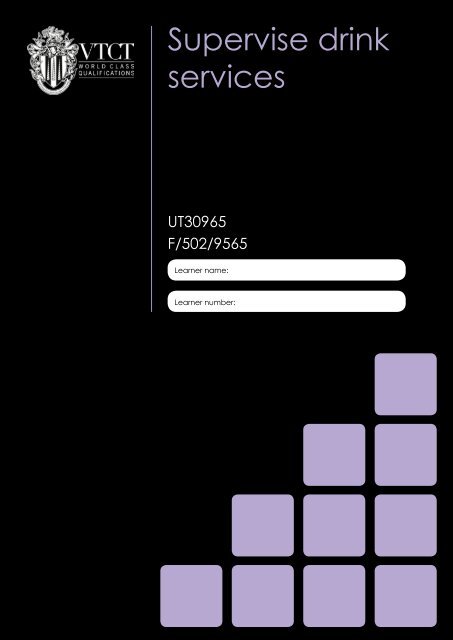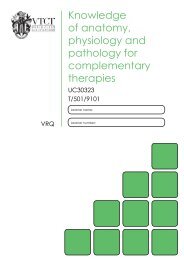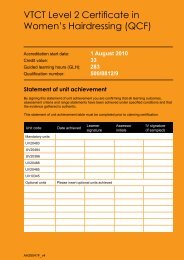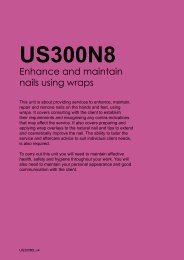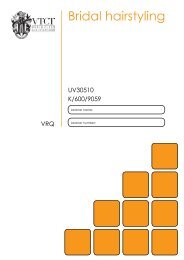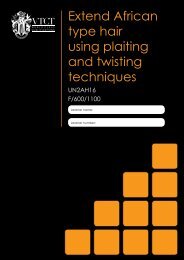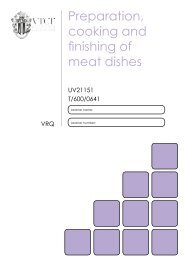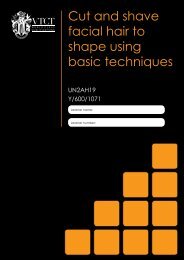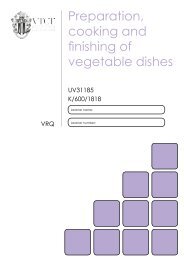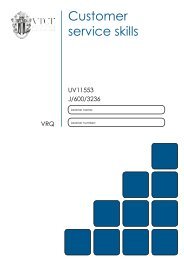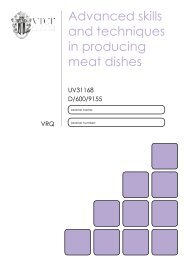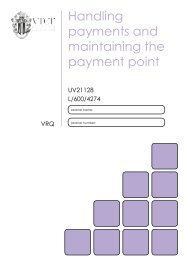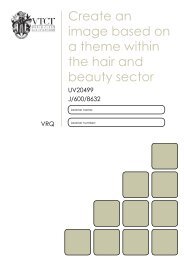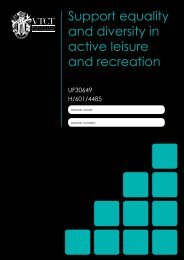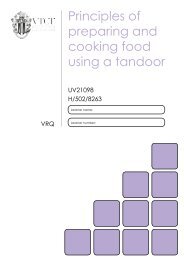Understand how to supervise drink services - VTCT
Understand how to supervise drink services - VTCT
Understand how to supervise drink services - VTCT
Create successful ePaper yourself
Turn your PDF publications into a flip-book with our unique Google optimized e-Paper software.
Supervise <strong>drink</strong><br />
<strong>services</strong><br />
UT30965<br />
F/502/9565<br />
Learner name:<br />
Learner number:
Statement of unit achievement<br />
By signing this statement of unit achievement you are confirming that all learning outcomes, assessment<br />
criteria and range statements have been achieved under specified conditions and that the evidence<br />
gathered is authentic.<br />
This statement of unit achievement table must be completed prior <strong>to</strong> claiming certification.<br />
Unit code Date achieved Learner signature<br />
Assessor tracking table<br />
<strong>VTCT</strong> is the specialist awarding body for the Hairdressing, Beauty Therapy, Complementary Therapy,<br />
Hospitality and Catering and Sport and Active Leisure sec<strong>to</strong>rs, with over 50 years of experience.<br />
<strong>VTCT</strong> is an awarding body regulated by national organisations including Ofqual, SQA, DfES and CCEA.<br />
<strong>VTCT</strong> is a registered charity investing in education and skills but also giving <strong>to</strong> good causes in the area<br />
of facial disfigurement.<br />
Assessor name Assessor signature<br />
Assessor<br />
initials<br />
Assessors<br />
initials<br />
IV signature<br />
(if sampled)<br />
All assessors using this Record of Assessment book must complete this table. This is required for<br />
verification purposes.<br />
Assessor number<br />
(optional)
UT30965<br />
Supervise <strong>drink</strong> <strong>services</strong><br />
The aim of this unit is <strong>to</strong> develop your knowledge,<br />
understanding and practical skills when supervising the<br />
preparation and delivery of the <strong>drink</strong> service. You will be<br />
able <strong>to</strong> deliver a friendly, hygienic and efficient service in<br />
relaxed safe surroundings, ensuring that the law is fully<br />
complied with and that cus<strong>to</strong>mer behaviour problems are<br />
dealt with quickly and correctly.<br />
UT30965_v7
NOS<br />
HSL11<br />
Level<br />
Credit value<br />
GLH<br />
3<br />
4<br />
30<br />
Observation(s)<br />
2<br />
External paper(s)<br />
0
Supervise <strong>drink</strong> <strong>services</strong><br />
Learning outcomes<br />
On completion of this unit you will:<br />
1. Be able <strong>to</strong> <strong>supervise</strong> <strong>drink</strong> <strong>services</strong><br />
2. <strong>Understand</strong> the requirements that need <strong>to</strong><br />
be met when supervising <strong>drink</strong> <strong>services</strong><br />
3. <strong>Understand</strong> <strong>how</strong> <strong>to</strong> <strong>supervise</strong> <strong>drink</strong> <strong>services</strong><br />
Evidence requirements<br />
1. Environment<br />
Evidence for this unit should be gathered<br />
within the workplace, <strong>how</strong>ever, you may<br />
be assessed within an approved realistic<br />
working environment (RWE) that meets<br />
People 1st’s criteria.<br />
2. Simulation<br />
Simulation is allowed for outcome 1j, if no<br />
naturally occurring evidence is available.<br />
3. Observation outcomes<br />
Competent performance of Observation<br />
outcomes must be demonstrated on<br />
at least two occasions. Assessor<br />
observations, witness testimonies and<br />
products of work are likely <strong>to</strong> be the most<br />
appropriate sources of performance<br />
evidence. Professional discussion may be<br />
used as supplementary evidence for those<br />
criteria that do not naturally occur.<br />
Assessed observations should not be<br />
carried out on the same day for the<br />
same learning outcome. There should be<br />
sufficient time between assessments for<br />
reflection and personal development.<br />
You need <strong>to</strong> meet the same standard on a<br />
regular and consistent basis. Separating<br />
the assessments by a period of at least two<br />
weeks is recommended as competence<br />
must be demonstrated on a consistent and<br />
regular basis.<br />
4. Knowledge outcomes<br />
There must be evidence that you possess<br />
all the knowledge and understanding<br />
listed in the Knowledge section of this<br />
unit. In most cases this can be done<br />
by professional discussion and/or oral<br />
questioning. Other methods, such as<br />
projects, assignments and/or reflective<br />
accounts may also be used.<br />
5. Tu<strong>to</strong>r/Assessor guidance<br />
You will be guided by your tu<strong>to</strong>r/assessor<br />
on <strong>how</strong> <strong>to</strong> achieve learning outcomes in this<br />
unit. All outcomes must be achieved.<br />
6. External paper<br />
There is no external paper for this unit.<br />
UT30965<br />
3
4<br />
Achieving observations<br />
and range<br />
Achieving observation outcomes<br />
Your assessor will observe your performance<br />
of practical tasks. The minimum number of<br />
competent observations required is indicated in<br />
the Evidence requirements section of this unit.<br />
Criteria may not always naturally occur during<br />
a practical observation. In such instances you<br />
will be asked questions <strong>to</strong> demonstrate your<br />
competence in this area. Your assessor will<br />
document the criteria that have been achieved<br />
through professional discussion and/or oral<br />
questioning. This evidence will be recorded<br />
by your assessor in written form or by other<br />
appropriate means.<br />
Your assessor will sign off a learning outcome<br />
when all criteria have been competently<br />
achieved.<br />
Achieving range<br />
There is no range section that applies <strong>to</strong> this<br />
unit.<br />
UT30965<br />
Guidance for tu<strong>to</strong>rs and assessors<br />
Tu<strong>to</strong>rs and assessors must refer <strong>to</strong> the<br />
document(s) listed below, prior <strong>to</strong> delivering<br />
this unit. Document(s) can be downloaded from<br />
http://www.people1st.co.uk:<br />
• Sec<strong>to</strong>r Assessment Strategy for<br />
competence based units of assessment<br />
and qualifications
Learning outcome 1<br />
Be able <strong>to</strong> <strong>supervise</strong> <strong>drink</strong> <strong>services</strong><br />
You can:<br />
a. Ensure staff have the skills, knowledge and<br />
resources <strong>to</strong> carry out their responsibilities*<br />
b. Agree procedures for staff <strong>to</strong> follow when<br />
preparing and re-s<strong>to</strong>cking the <strong>drink</strong> service<br />
area*<br />
c. Ensure that the attractiveness and comfort<br />
of <strong>drink</strong>ing areas meet cus<strong>to</strong>mer needs and<br />
expectations*<br />
d. Liaise with other relevant people and<br />
departments <strong>to</strong> ensure the delivery of an<br />
effective <strong>drink</strong> service*<br />
e. Carry out preparations in good time <strong>to</strong> allow<br />
the scheduled <strong>drink</strong> service <strong>to</strong> be provided*<br />
f. Ensure specified standards and procedures<br />
for the service of products are maintained*<br />
g. Ensure the <strong>drink</strong> service complies with<br />
social responsibility practices and relevant<br />
legislation*<br />
h. Confirm that communication with cus<strong>to</strong>mers<br />
by all staff takes place in a manner that is<br />
appropriate <strong>to</strong> them and the situation*<br />
*May be assessed by supplementary evidence.<br />
Observations<br />
Observation 1 2 Optional Optional<br />
Criteria questioned orally<br />
Date achieved<br />
Portfolio reference<br />
Learner signature<br />
Assessor initials<br />
i. Maintain the comfort and wellbeing of<br />
other cus<strong>to</strong>mers and local residents when<br />
carrying out activities*<br />
j. Deal with any problems promptly and<br />
effectively when moni<strong>to</strong>ring <strong>drink</strong> service<br />
areas*<br />
UT30965<br />
5
6<br />
Developing knowledge<br />
Achieving knowledge outcomes<br />
You will be guided by your tu<strong>to</strong>r and assessor<br />
on the evidence that needs <strong>to</strong> be produced.<br />
Your knowledge and understanding will be<br />
assessed using the assessment methods listed<br />
below*:<br />
• Projects<br />
• Observed work<br />
• Witness statements<br />
• Audio-visual media<br />
• Evidence of prior learning or attainment<br />
• Written questions<br />
• Oral questions<br />
• Assignments<br />
• Case studies<br />
• Professional discussion<br />
Where applicable your assessor will integrate<br />
knowledge outcomes in<strong>to</strong> practical observations<br />
through professional discussion and/or oral<br />
questioning.<br />
When a criterion has been orally questioned<br />
and achieved, your assessor will record this<br />
evidence in written form or by other appropriate<br />
means. There is no need for you <strong>to</strong> produce<br />
additional evidence as this criterion has already<br />
been achieved.<br />
Some knowledge and understanding outcomes<br />
may require you <strong>to</strong> s<strong>how</strong> that you know and<br />
understand <strong>how</strong> <strong>to</strong> do something. If you have<br />
practical evidence from your own work that<br />
meets knowledge criteria, then there is no<br />
requirement for you <strong>to</strong> be questioned again on<br />
the same <strong>to</strong>pic.<br />
*This is not an exhaustive list.<br />
UT30965
Knowledge<br />
Learning outcome 2<br />
<strong>Understand</strong> the requirements that need <strong>to</strong> be met when<br />
supervising <strong>drink</strong> <strong>services</strong><br />
You can: Portfolio reference<br />
a. State where <strong>to</strong> find information about licensing legislation<br />
b. Describe the basic legal requirements that affect the <strong>drink</strong> service<br />
and <strong>how</strong> <strong>to</strong> implement these in relation <strong>to</strong>:<br />
• permitted hours<br />
• closing time<br />
• licences<br />
• residents and non-residents<br />
• diners and non-diners<br />
• young persons, service and employment<br />
• right <strong>to</strong> eject and duty <strong>to</strong> refuse service<br />
• gaming, betting and lotteries<br />
• public entertainment<br />
• weights and measures<br />
• price lists, notices and payment for <strong>drink</strong>s<br />
• drugs<br />
• trade descriptions and consumer protection laws<br />
c. Explain the implications of failing <strong>to</strong> implement basic legal<br />
requirements<br />
d. Explain <strong>how</strong> <strong>to</strong> identify and correct deviations from legislation and<br />
industry specific regulations<br />
e. Describe the organisation’s policies and procedures that are<br />
relevant <strong>to</strong> the <strong>drink</strong> service<br />
f. Describe the various procedures that need <strong>to</strong> be followed for the<br />
preparation of the <strong>drink</strong> service area, including those relating <strong>to</strong>:<br />
• clearing<br />
• s<strong>to</strong>cking products<br />
• equipment<br />
UT30965 7
8<br />
Learning outcome 3<br />
<strong>Understand</strong> <strong>how</strong> <strong>to</strong> <strong>supervise</strong> <strong>drink</strong> <strong>services</strong><br />
You can: Portfolio reference<br />
a. Explain <strong>how</strong> <strong>to</strong> <strong>supervise</strong> the preparation of the <strong>drink</strong> service area<br />
so that the service meets organisational requirements and is ready<br />
in time<br />
b. Describe the range of products in own area of responsibility<br />
c. Explain <strong>how</strong> <strong>to</strong> prepare and serve the range of products in own<br />
area of responsibility<br />
d. Explain the roles and responsibilities of people in own area of<br />
responsibility and in other parts of the organisation as relevant <strong>to</strong><br />
the <strong>drink</strong> service<br />
e. Describe the skills and knowledge staff need <strong>to</strong> carry out their<br />
responsibilities effectively<br />
f. Compare different methods of moni<strong>to</strong>ring the <strong>drink</strong>s service area<br />
effectively<br />
g. Explain <strong>how</strong> <strong>to</strong> moni<strong>to</strong>r and <strong>supervise</strong> staff practice in order <strong>to</strong><br />
maintain standards<br />
h. Explain what action needs <strong>to</strong> be taken when preparation and<br />
delivery standards are not met<br />
i. Explain <strong>how</strong> <strong>to</strong> identify and address the problems that can affect<br />
the <strong>drink</strong> service and the preparation of areas<br />
j. Explain <strong>how</strong> <strong>to</strong> develop contingency plans <strong>to</strong> reduce the impact of<br />
<strong>drink</strong> service problems<br />
k. Explain <strong>how</strong> <strong>to</strong> reallocate work <strong>to</strong> different members of staff <strong>to</strong><br />
reduce the impact of service problems<br />
UT30965
Learning outcome 3 (continued)<br />
<strong>Understand</strong> <strong>how</strong> <strong>to</strong> <strong>supervise</strong> <strong>drink</strong> <strong>services</strong><br />
You can: Portfolio reference<br />
l. Describe <strong>how</strong> <strong>to</strong> vary practice according <strong>to</strong>:<br />
• quiet periods<br />
• busy periods<br />
• delivery of service <strong>to</strong> cus<strong>to</strong>mers with special requirements<br />
m. Explain <strong>how</strong> an effective <strong>drink</strong> service affects profitability and<br />
cus<strong>to</strong>mer satisfaction<br />
n. Describe the possible consequences of alcohol misuse<br />
o. Describe best practice in the refusal of service<br />
p. Explain <strong>how</strong> <strong>to</strong> communicate and deal effectively with the range of<br />
cus<strong>to</strong>mer groups (including those who are experiencing the effects<br />
of alcohol)<br />
q. Explain the importance of effective communication<br />
UT30965 9
10<br />
UT30965<br />
Notes<br />
Use this area for notes and diagrams


